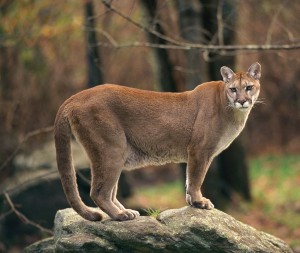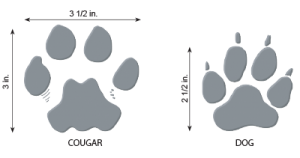Guidelines for living with cougars
 Cougars, also called mountain lions, are Oregon’s largest cat species. While cougar sightings and encounters are relatively rare, it is wise to educate yourself about cougars.
Cougars, also called mountain lions, are Oregon’s largest cat species. While cougar sightings and encounters are relatively rare, it is wise to educate yourself about cougars.
Native to Oregon, cougars range throughout the state. Population densities vary depending on habitat — the highest densities occur in the Blue Mountains in the northeastern part of the state and in the southwestern Cascade Mountains. Oregon’s current cougar population is estimated at more than 5,000. Cougars are carnivores. Their primary food source is deer, but they also will take elk, raccoons, bighorn sheep and other mammals and birds. As a top predator, the health of the cougar population is a good indicator of the health of the entire ecosystem.
Attention on these animals has increased as Oregon’s human population expands and more people work, play and live in areas inhabited by these big cats. By following the guidelines in this brochure, you can reduce your chances of a negative encounter.
Cougar tracks versus dog tracks
Cougar tracks
- Tracks do not generally include claw marks because cougars have retractable claws.
- The heal pad has three distinct lobes at the base and is indented at the top, forming a distinct “M” shape.
Dog tracks
- Tracks usually include claw marks.
- The heel pads are more rounded.
Living in Cougar Country
Some common sense guidelines can keep you and your neighborhood safe.
- Learn the neighborhood. Be aware of any wildlife corridors or places where deer or elk concentrate.
- Walk pets during the day and keep them on a leash.
- Keep pets indoors at dawn and dusk. Shelter them for the night.
- Feed pets indoors.
- Don’t leave food or garbage outside.
- Use animal-proof garbage cans if necessary.
- Remove heavy brush from near the house and any play areas.
- Install motion-activated light outdoors along walkways and driveways.
- Be more cautious at dawn and dusk when cougars are most active.
- Do not feed any wildlife. By attracting other wildlife, you may attract a cougar.
- Keep areas around bird feeders clean.
- Deer-proof your garden and yard with nets, lights and fencing.
- Fence and shelter livestock. Move them to sheds or barns at night.
- Report any cougar sighting or encounter to a local ODFW office or Oregon State Police office.
Recreating in Cougar Country
Cougars usually will sense people and leave an area, but by following these guidelines you can further minimize your risk of encountering one.
- Be aware of your surroundings at all times.
- Leave your dog at home or keep it on a leash.
- Pets running free may lead a cougar back to you.
- Hike in groups. Make noise to alert wildlife of your presence.
- Keep children close to you. Teach them about wildlife.
- Keep campsites clean. Sleep 100 yards from cooking areas.
- Store food in animal-proof containers.
- Carry deterrent spray.
- Be cautious at dusk and dawn.
- Never feed any wildlife. Prey attracts predators.
- Do not approach any wildlife; stay at least 100 yards away.
- Steer clear of baby wildlife. The mother is likely nearby.
- Be alert when sitting quietly or stopping to rest.
- Hunters must be especially alert at dawn and dusk when cougars are most active.
- Be aware that animal calls and animal kills can attract a cougar.
- Report any cougar sighting or encounter to a local ODFW office or Oregon State Police office.
Encountering a Cougar
Cougars often will retreat if given the opportunity. Always leave the animal a way to escape.
- Stay calm and stand your ground.
- Maintain direct eye contact.
- Pick up any children, but do so without bending down or turning your back on the cougar.
- Back away slowly.
- Do not run. Running triggers a response in cougars which could lead to an attack.
- Raise your voice and speak firmly.
- If the cougar seems aggressive, raise your arms to make yourself look larger and clap your hands.
- If in the very unusual event that a cougar attacks you, fight back with rocks, sticks, garden tools or any other items available.


